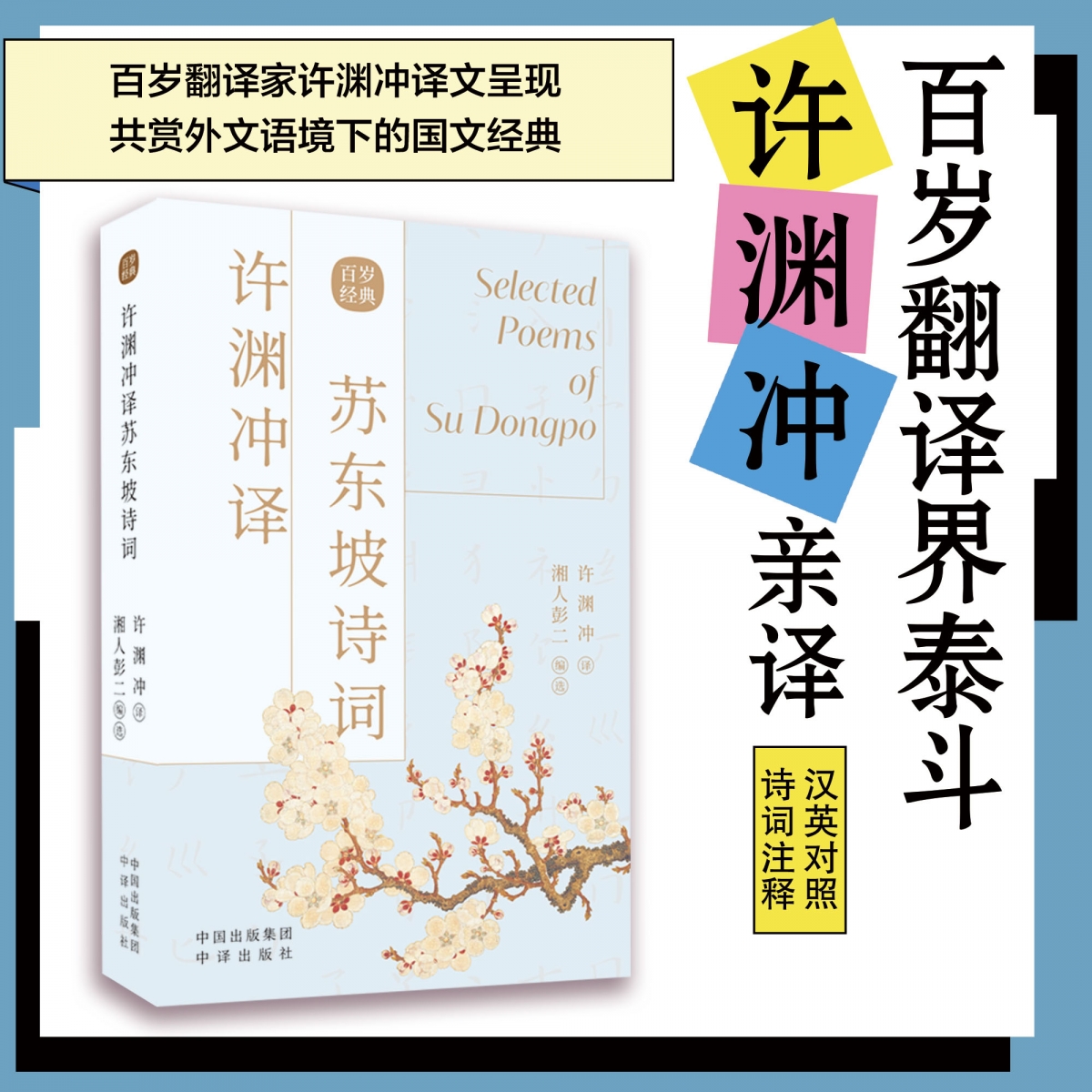
出版社: 中译
原售价: 59.00
折扣价: 34.90
折扣购买: 许渊冲译苏东坡诗词
ISBN: 9787500178200

许渊冲,生于1921年,北京大学教授,著名翻译家,著译有中、英、法文作品百余部,被誉为“诗译英法唯一人”。中文著作有《翻译的艺术》《文学翻译谈》等;英文著作有《中诗英韵探胜——从诗经到西厢记》《逝水年华》等。英文译著有《诗经》《唐诗三百首》《西厢记》等;法文译著有《中国古诗词三百首》等。翻译过莎士比亚、德莱顿、雨果、司汤达、巴尔扎克等英法文学家的经典作品多部。 2010年获得中国翻译协会表彰个人的最高荣誉奖项——中国翻译文化终身成就奖。2014年获得国际翻译界最高奖项之一——国际翻译家联盟(国际译联)2014“北极光”杰出文学翻译奖。2020年获全球华人国学大典海外影响力奖。
前言 苏轼(1037—1101),别号东坡(东坡居士),是我国宋代最著名的诗人。林语堂在《苏东坡传》序言中说:像苏东坡这样富有创造力,这样刚正不阿,这样放任不羁,这样令人万分倾倒而又望尘莫及的高士,是人间不可无一、难得有二的。苏东坡有其迷人的魅力,犹如魅力之在女人,美丽芬芳之在花朵。苏东坡的人品,具有一个多才多艺的天才的深厚、广博,有高度的智力,有天真烂漫的赤子之心——正如耶稣所说“具有蛇的智慧,还兼有鸽子的温柔敦厚”。在这些方面,其他诗人是不能望其项背的。这些品质汇聚于一身,是天地间的凤毛麟角,不可能多见的。他保持天真纯朴,终身不渝。他的诗词文章,都是自然流露,顺乎天性,正如他所说的“春鸟秋虫之声”。从他的笔端,我们能听到人类情感之弦的振动,有喜悦,有愉快,有梦幻的觉醒,有顺从的忍受。苏东坡会因事发怒,但是他却不会恨人。因为恨别人,是自己无能的表现。苏东坡并非才不如人,因此也从不恨人。他的一生是载歌载舞,深得其乐,忧患来临,一笑置之。从佛教的否定人生,儒家的正视人生,道家的简化人生,这位诗人在心灵识见中产生了他混合的人生观。这一生,他只是永恒在刹那的一个微粒,他究竟是哪一个微粒,有何关乎重要?生命毕竟是不朽的、美好的。所以他尽情享受人生。这就是林语堂眼中的旷古奇才苏东坡。 Preface Su Shi (1037—1101) is better known under the name of Su Dongpo (Master of the Eastern Slope). He was, said Lin Yutang in The Gay Genius, a man with great charm, originality and integrity of purpose. It is easy to feel his charm as to feel it in women and to feel beauty and fragrance in flowers. There had to be one Su Dongpo, but there could not be two. His personality had the richness and variety of a many-sided genius, possessing a combination described by Jesus as the wisdom of the serpent and the gentleness of the dove. All through his life he retained a perfect naturalness and honesty with himself. His poems were the natural outpourings of his heart, instinctive and impetuous, like the bird,s song in spring and the cricket,s chirp in autumn. He wrote purely to express what he felt in his heart, for no other reason than that he enjoyed writing. He felt strongly, thought clearly, wrote beautifully, and acted with high courage. From his pen we hear a chord reflecting all the human emotions of joy, delight, disillusionment and resignation. He hated evil, but the evil-doers did not interest him. Since hatred is an expression of incompetence, he never knew personal hatred, because he did not know incompetence. Out of the Buddhist faith to annihilate life, the Confucian faith to live it, and the Taoist faith to simplify it, a new amalgam was formed in the crucible of the poet,s mind and perceptions. Of this living, he was only a particle in a temporary manifestation of the eternal, and it really did not matter very much which particle he happened to be. Life was after all eternal and good, and he enjoyed it. Such is Su Dongpo as Lin Yutang sees him. 饮湖上初晴后雨二首(其二) Drinking at the Lake First in Sunny and then in Rainy Weather (1073) 水光潋滟晴方好, 山色空蒙雨亦奇。 欲把西湖比西子①, 淡妆浓抹总相宜②。 The brimming waves delight the eye on sunny days; The dimming hills give a rare view in rainy haze. The West Lake looks like the fair lady at her best; Whether she is richly adorned or plainly dressed. ①西子:西施,春秋时期越国著名的美女。 ②总相宜:总显得十分美丽。 赏析 宋神宗熙宁四年(1071 年)至七年(1074 年),苏轼任杭州通判期间,曾写下大量有关西湖的诗,这是其中最脍炙人口的一首。 “水光潋滟晴方好”,诗的起首就抓住了西湖的特点,任谁第一次走到西湖去,都要被波光粼粼的湖水所吸引。晴天的西湖很好,我们赞同苏轼的看法。 而第二句的意思又来了一个突转,“山色空蒙雨亦奇”,由水的光影转为对山色的观察。雨中的西湖也是美的,我们也同意苏轼的这个看法。 而这首诗的后两句,更秒杀古往今来一切有关西湖的诗歌。 “西子”是指西施,她是春秋时越国有名的美女,中国古代四大美女之首。而苏轼想说,西湖不也如此吗?无论晴光照水还是雨雾迷蒙,它都一样动人。他将肌肤如玉的西子和水波荡漾的西湖联系起来,从此便不能分开。 许多地方都有西湖,但杭州的西湖独具西子的美。那是真实的、可感的美,又是抽象、虚幻的美,都一样迷人。西子早已不在,谁也不知她长得如何,但西湖却是真实的,我们通过西湖仿佛认识了西子。 而苏轼的这首诗,也容易让人想起他后来在黄州写的一首词《定风波》: 莫听穿林打叶声,何妨吟啸且徐行。竹杖芒鞋轻胜马,谁怕?一蓑烟雨任平生。 料峭春风吹酒醒,微冷,山头斜照却相迎。回首向来萧瑟处,归去,也无风雨也无晴。 无论雨天,还是晴天,这都是人生的风景。 无论此时顺境中所处的杭州西湖,还是日后被贬而身在黄州,苏轼都如他诗词里写到的,走得潇洒而坚定。 也许可以说:苏轼的达观和宽阔,从西湖边开始孕育、发芽;而在黄州,它长成了参天大树。 ?翻译界泰斗许渊冲代表译作 ?精选苏东坡代表诗词57首,领略东坡居士的“豪情”与“豁达” ?双语阅读,提升英文阅读能力,感受中国经典在外文语境下的独特魅力 ?新增诗词注释,更便于读者理解和背诵
